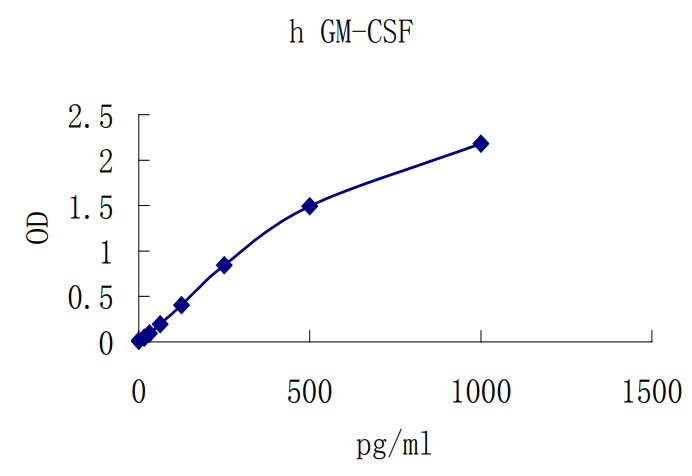Product Detail
Product NameHuman GM-CSF ELISA kit
ApplicationsELISA
Species ReactivityHu
SpecificityNatural and recombinant Human GM-CSF Ligand
Target NameHuman GM-CSF
Application Details
Detect Range: 31.25-2000pg/ml
Sensitivity: 7pg/mL
Sample Type: Cell culture supernatant, serum, plasma (EDTA, citrate, heparin)
Sample Volume: 20 uL
Assay Time: 3 hours
Detection method: Colorimetric
Granulocyte macrophage colony stimulating factor (GM-CSF) is a pleiotropic cytokine with multiple effects on hematopoietic cells (1-4). It mobilizes CD34+ progenitor cells into the periphery and stimulates their proliferation, survival and differentiation into neutrophils,monocytes/ macrophages, eosinophils, and myeloid dendritic cells (4-8). On these terminallydifferentiated myeloid cells, GM-CSF is also needed for inducing their effector functions (7-10). In addition, GM-CSF has been shown to stimulate the proliferation and differentiation of the erythroid and megakaryoctye progenitor cells (4).
GM-CSF is produced by a number of different cell types, including keratinocytes, mature and immature NK cells, type II alveolar cells), endothelial cells, monocytes, bone-marrow mesenchymal stem cells, CD4+ and CD8+ T cells, megakaryocytes, B cells, eosinophils, chondrocytes and fibroblasts.
Human GM-CSF cDNA encodes a 144 amino acid (aa) residue precursor protein with a 17 aa putative signal peptide and a 127 aa mature protien (11 - 13). Natural GM-CSF is a monomer that contains both N- and O-linked glycosylation (14). Mature human GM-CSF shares approximately 55%, 63% and 68% aa sequence homology with mouse, rat and canine. GM-CSF, respectively. Human GM-CSF is not biologically active on mouse cells (11), but was reported to have some activity on canine cells (15).
GM-CSF exerts its activity through binding to a high affinity receptor complex consisting of two membrane glycoproteins. The presence of the spliced variants in the heteromeric receptor complex can regulate the functions of the complex (16).



 YES
YES



